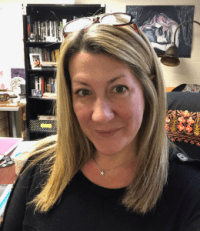
Women, Gender, and Sexuality Studies (Minor)
The Women, Gender, and Sexuality Studies minor relies on multi-disciplinary approaches to the study of women and the social, cultural, and historical constructions of gender and sexuality, particularly as they intersect with race, ethnicity, class, culture, religion, and nation. Students will take at least one foundational course and courses from other disciplines with at least one of those serving as a capstone experience.
- Degrees & Offerings
-
- Minor
- Location
-
- Bloomsburg
- Lock Haven
- Mansfield
- Department
- College
Petitions for Independent Research or Internships
Independent studies, individualized instruction, departmental research and writing courses, and internships can be counted toward the minor if the project, study, or agency specifically reflects the curriculum goals of the Women, Gender, and Sexuality Studies Minor upon approval by the advisory board members.
Courses and Curriculum
Women, Gender, and Sexuality Studies Minor Requirements
- 18 credits required for minor completion
- Students should meet with their academic advisor each semester and use Degree Works to monitor their individual progress toward completion of the minor.
Christina Francis, Ph.D., WGSS Director, Professor of English
Christina Francis received her Ph.D. degree in 2004 from Arizona State University. She has served as the Director for the Gender Studies Minor since Fall 2015. She also works as the advisor to English Honor Society Sigma Tau Delta and the English Club. She co-chairs and organizes the annual High School Conference on Diversity which happens every November on the BU campus, bringing high school students from the region to campus for a day of interactive workshops on diversity.
The courses Dr. Francis teaches for the Gender Studies Minor include Feminist Reading of Culture and Popular Literature. Her research focuses on Arthurian literature of the Middle Ages and contemporary Arthurian medievalism. Some of her publications include 1) “Malory’s Bloody Bedrooms” for Arthurian Literature (Boydell & Brewer, 2011) and “Playing with Gender in Arthur, King of Time and Space” for the journal Arthuriana 20.4 (2010). She is currently working on a book-length study of the BBC series Merlin.
Kristie Byrum, Ph.D. APR, Assistant Professor of Mass Communications
Kristie Byrum earned a Ph.D. degree in Rhetorics, Communication, and Information Design (RCID) from Clemson University. With her research on the intersection of communication and corporate social responsibility, she offers insights to the evolving public relations profession. A recognized entrepreneur, she founded several businesses, including three public relations agencies and a venture-funded dot-com company.
She was a visiting scholar to the European Graduate School for Media and Communication in Saas-Fee, Switzerland in 2013 and is accredited by the Public Relations Society of America (PRSA). Kristie Byrum previously taught Women’s and Gender Studies courses at the University of South Carolina Upstate and Clemson University. She holds a B.A. degree in Journalism from the Pennsylvania State University and an M.A. degree in Journalism and Mass Communications from the University of South Carolina.
Kelly Dauber, Ph.D., Assistant Professor of Exercise Science
Kelly Dauber received her Ph.D. degree from Springfield College (MA) in Physical Education Teaching and Administration. She came to Bloomsburg University in 2006, and she currently teaches the course, Women in Sport, for the Gender Studies Minor. She enjoys researching and presenting on the female-athlete paradox as well as the double jeopardy faced by women in sport.
Jessica Defenderfer, Ph.D., Assistant Professor of Political Science
Jessy Defenderfer is an Assistant Professor of Political Science at Bloomsburg University. She teaches many of the department’s political behavior courses, including Campaigns and Elections, Public Opinion, Women and Politics, and the Democratic Citizenship of Harry Potter. She completed her PhD in the Department of Political Science at The Ohio State University in August 2015 where she focused on the impact of personal value systems on the effective framing of political messages. She researches in the field of political psychology, applying psychological concepts to individual voter behavior, particularly the behavior of women and racial minorities. Prior to Ohio State, She completed a Master of Public Policy at The George Washington University and utilized these skills as a legislative analyst for the Service Employees International Union in Washington, DC, where she had the unique opportunity to campaign for Barack Obama’s 2008 presidential campaign. During these early graduate studies in DC, she also had the opportunity to intern for Congresswoman Diana DeGette (CO-1) and for AARP.
David Heineman, Ph.D., Associate Professor of Communication Studies
David Heineman earned his Ph.D. degree in Communication Studies with a certification from the Project on the Rhetorics of Inquiry from the University of Iowa and Masters and Bachelors degrees in Speech Communication from Syracuse University. He is an advisor to the Bloomsburg chapter of the Lambda Pi Eta National Honor Society and an active member of the National Communication Association. He regularly presents his work at international, national, and regional conferences.
Heineman’s primary research interests are located at the intersection of rhetorical theory and criticism and new media technologies. In 2012, he co-authored the book, Rhetoric Online: The Politics of New Media, for Peter Lang Press and he is currently writing a book for inclusion in the Digital Game Studies series by the Indiana University Press. Other recent scholarship has focused on gender in media, the rhetoric of memes, and digital aesthetics. He also has research interests in visual rhetoric, public memory, social movements, the rhetoric of science and technology, media criticism, narrative theory, and political communication. He teaches classes such as Gender Issues in Communication, Media and Visual Culture, Understanding Social Influence, and Examining Communication.
Monica Johnson, Director of the Women’s Resource Center
Monica Johnson is currently the Director of the Women's Resource Center on the Bloomsburg Campus.
Yahya Laayouni, Ph.D., Assistant Professor of Arabic and French
Yahya Laayouni received a BA degree in English Literature and an MA degree in Gender Studies at Mohammed Ibn Abdellah University in Fez, Morocco. He earned his Ph.D. degree at the University of Pittsburgh in 2012.
His primary field of research concentrates on Beur cinema as an emerging genre and on the construction of subjectivity in Beur films. Part of his work focuses on the issue of gender in Beur films, particularly the representations of women and gay Beurs. His theoretical framework is founded on visual alterity, narrative identity, and theories of subjectivity. He is also interested in francophone Arab-Islamic literature and culture and Orientalism.
Carolyn Lamacchia, Ph.D., Associate Professor of Information Technology, Analytics and Business Education
Carolyn Lamacchia received a BSBA degree at Temple University, M.B.A. at Drexel University, and Ph.D. degree in Computer Information Systems at Nova Southeastern University.
Jennifer Oast, Ph.D., Associate Professor of History
Jennifer Oast earned her Ph.D. degree in Early American History at the College of William and Mary in 2008. Her book manuscript," Institutional Slavery," forthcoming from Cambridge University Press, examines slaveholding by colleges, free schools, churches, businesses, and the government in Virginia between 1680 and 1860. In the History Department, she teaches survey courses on early American History as well as classes on African American History, Colonial America, and the American Revolution.
She enjoys working with students as the faculty advisor for the History Club and Phi Alpha Theta, the History Honor Society. She also serves on the Social Equity Scorecard Committee, the Board of the Institute for Culture and Society, and the Board of the Frederick Douglass Institute Advisory Committee.
- Gender and Sexuality in Society: Students will describe and analyze the construction of gender and sexuality culturally, politically, and historically, and as it relates to various identity categories including but not limited to race, class, culture, ethnicity, age, and disability.
- Critical Reasoning: Students will identify and explain concepts relevant to identity formation, applying those concepts to the representations of gender and sexuality in society.
- Critical Analysis: Students will identify and analyze multicultural social and environmental issues from the perspectives of gender and sexuality both in the United States and in the global contexts.
- Diversity: Students will recognize the historical and cultural roots of inequality and respond to the need for social justice. Emphasis will be given to the representation of women as a gender category and its place in the development of this field of study.
The Commonwealth Difference

Program Contacts
Applying to This Program
Apply
-
Application Process
Review the step-by-step process whether you're a first-year student, transferring to CU, or more.
-
Apply Now
By starting your application, you gain access to your personalized application portal to view your progress.
-
Scholarships
As the largest comprehensive university in north central and northeastern Pennsylvania, CommonwealthU works hard to provide a world-class education that consistently rates among the best values in the nation.
Explore More
-
Explore Commonwealth University
There's no better way to learn more than to experience Commonwealth University for yourself! Set up a campus tour or connect with us virtually.
-
Connect with Your Admissions Counselor
Applying to college is a big step. You have questions, and we have answers!
-
Understanding Financial Aid
Financial Aid can be a complex topic. Our Financial Aid team is here to tell you what you need to know and help you navigate the financial aid process.




